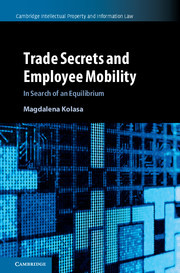Description
Trade Secrets and Employee Mobility: Volume 44
In Search of an Equilibrium
Cambridge Intellectual Property and Information Law Series
Author: Kolasa Magdalena
A comparative analysis of trade secrets enforcement against ex-employees in the EU and USA, aimed at legislators and practitioners.
Language: English
Subject for Trade Secrets and Employee Mobility: Volume 44:
Approximative price 135.14 €
In Print (Delivery period: 14 days).
Add to cart
Publication date: 02-2018
408 p. · 15.8x23.5 cm · Hardback
408 p. · 15.8x23.5 cm · Hardback
Description
/li>Contents
/li>Biography
/li>
In the increasingly knowledge- and innovation-based economy in which the mobility of the workforce is vital, employees and ex-employees are considered to be one of the biggest threats to the existence of trade secrets. The interests of the former parties to the employment relationship are contradictory: employers want to safeguard their competitive position by limiting use of information, and employees want to use that information to pursue their professional career. Magdalena Kolasa analyses existing guidelines that determine the extent to which former employees may use information learned during service. She proposes criteria for a balanced enforcement of trade secrets, discussing the statutory and implicit confidentiality duties, contractual protection, and remedies. Drawing from the laws of Germany, UK, and USA, and considering the EU Trade Secrets Directive, this book advocates an approach which recognises the value and functions of trade secrecy both within companies and in the context of public policy.
Introduction; 1. Conflict of interests: confidentiality, mobility of employees and innovation policy; 2. Concept of trade secrets; 3. Trade secret, employee's skill and knowledge or public domain information: where to draw the line?; 4. Contractual freedom to regulate use of trade secrets after termination of employment; 5. Remedies.
Magdalena Kolasa specialises in the law of intellectual property. Having worked for several years in private practice she conducted her doctoral research in the area of trade secrets at the Max Planck Institute for Innovation and Competition. She currently works as lawyer in the European Patent Office.
© 2024 LAVOISIER S.A.S.

